Exploring Absenteeism & Psychological Contracts in Human Resources
VerifiedAdded on 2023/06/17
|11
|3796
|463
Essay
AI Summary
This essay delves into key aspects of Human Resource Management, focusing on employee absenteeism and the significance of psychological contracts. It identifies causes of absenteeism such as low employee engagement, lack of flexible work schedules, workplace burnout, harassment, time theft, injuries, illness, and mental health issues. The essay proposes strategies to manage absenteeism, including workplace surveys, flexible working hours, employee engagement programs, wellness initiatives, reward systems for good attendance, fostering teamwork, providing feedback, and tracking employee absences. Furthermore, it distinguishes between psychological contracts (unwritten expectations) and formal employment contracts, highlighting the importance of fairness and managing expectations to maintain a positive employer-employee relationship and prevent issues like reduced productivity and workplace deviance. The comprehensive analysis provides valuable insights for HR professionals seeking to improve employee well-being and organizational effectiveness.

Introduction to Human
Resource Management
and Learning and
Talent Development
Resource Management
and Learning and
Talent Development
Paraphrase This Document
Need a fresh take? Get an instant paraphrase of this document with our AI Paraphraser
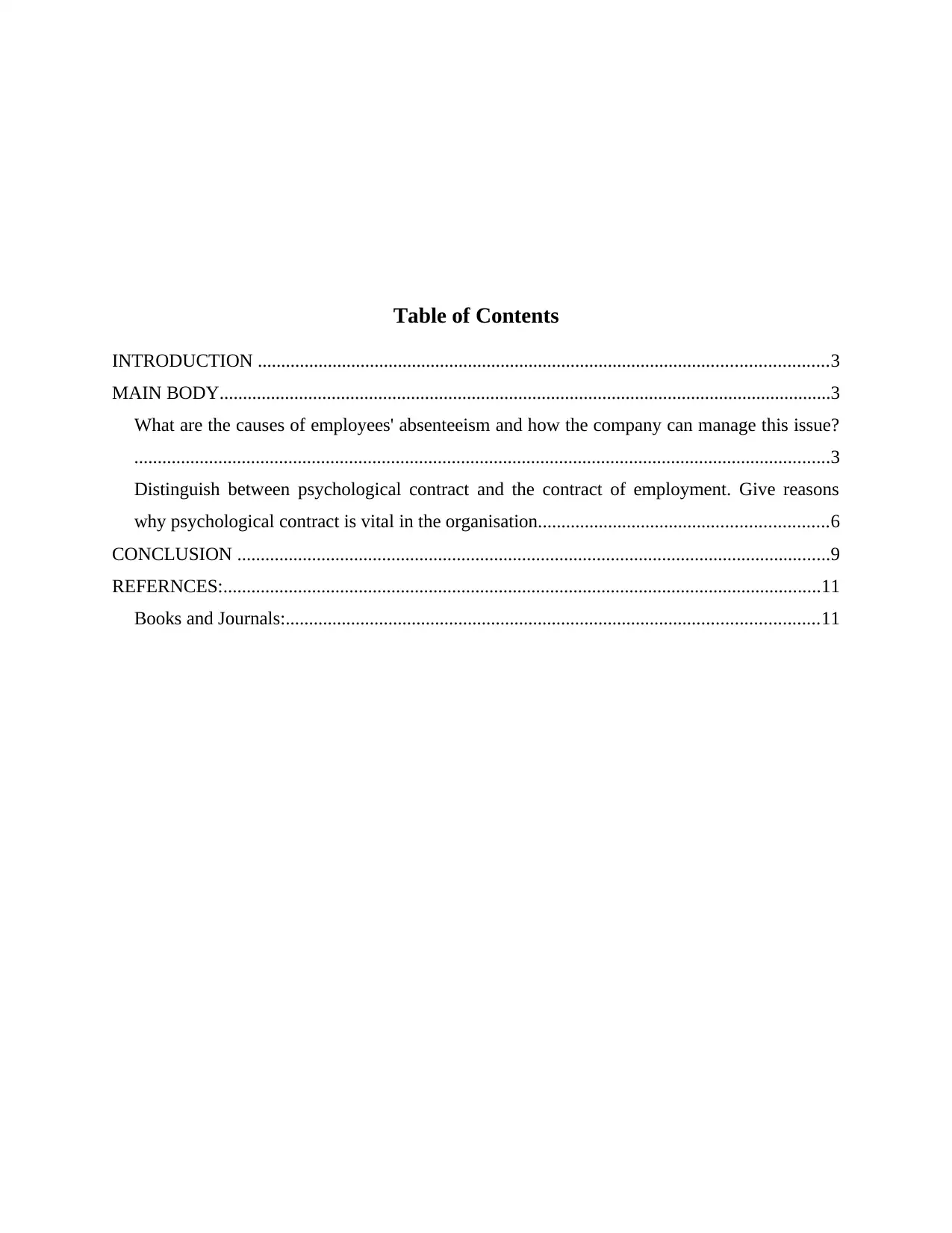
Table of Contents
INTRODUCTION ..........................................................................................................................3
MAIN BODY...................................................................................................................................3
What are the causes of employees' absenteeism and how the company can manage this issue?
.....................................................................................................................................................3
Distinguish between psychological contract and the contract of employment. Give reasons
why psychological contract is vital in the organisation..............................................................6
CONCLUSION ...............................................................................................................................9
REFERNCES:................................................................................................................................11
Books and Journals:..................................................................................................................11
INTRODUCTION ..........................................................................................................................3
MAIN BODY...................................................................................................................................3
What are the causes of employees' absenteeism and how the company can manage this issue?
.....................................................................................................................................................3
Distinguish between psychological contract and the contract of employment. Give reasons
why psychological contract is vital in the organisation..............................................................6
CONCLUSION ...............................................................................................................................9
REFERNCES:................................................................................................................................11
Books and Journals:..................................................................................................................11
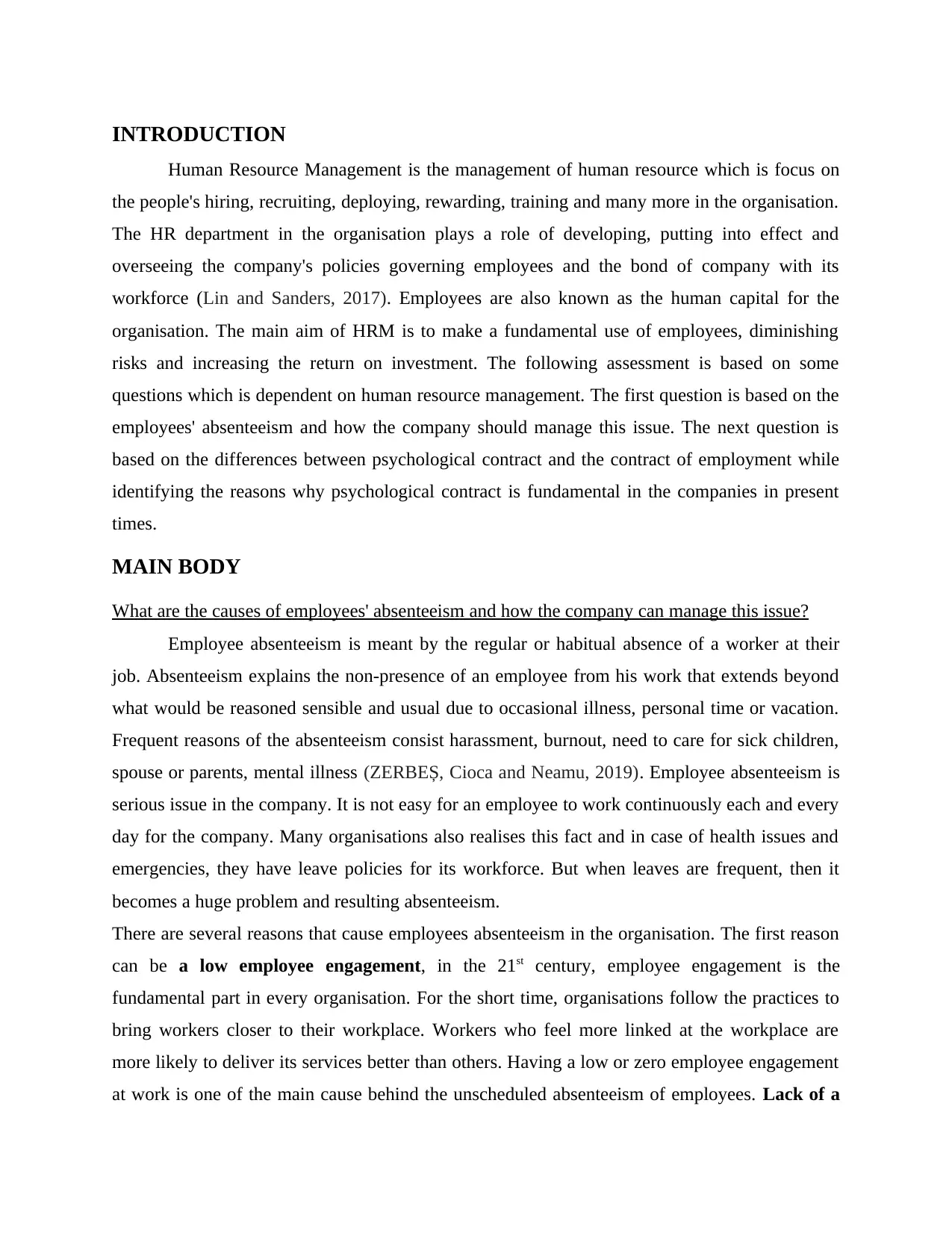
INTRODUCTION
Human Resource Management is the management of human resource which is focus on
the people's hiring, recruiting, deploying, rewarding, training and many more in the organisation.
The HR department in the organisation plays a role of developing, putting into effect and
overseeing the company's policies governing employees and the bond of company with its
workforce (Lin and Sanders, 2017). Employees are also known as the human capital for the
organisation. The main aim of HRM is to make a fundamental use of employees, diminishing
risks and increasing the return on investment. The following assessment is based on some
questions which is dependent on human resource management. The first question is based on the
employees' absenteeism and how the company should manage this issue. The next question is
based on the differences between psychological contract and the contract of employment while
identifying the reasons why psychological contract is fundamental in the companies in present
times.
MAIN BODY
What are the causes of employees' absenteeism and how the company can manage this issue?
Employee absenteeism is meant by the regular or habitual absence of a worker at their
job. Absenteeism explains the non-presence of an employee from his work that extends beyond
what would be reasoned sensible and usual due to occasional illness, personal time or vacation.
Frequent reasons of the absenteeism consist harassment, burnout, need to care for sick children,
spouse or parents, mental illness (ZERBEȘ, Cioca and Neamu, 2019). Employee absenteeism is
serious issue in the company. It is not easy for an employee to work continuously each and every
day for the company. Many organisations also realises this fact and in case of health issues and
emergencies, they have leave policies for its workforce. But when leaves are frequent, then it
becomes a huge problem and resulting absenteeism.
There are several reasons that cause employees absenteeism in the organisation. The first reason
can be a low employee engagement, in the 21st century, employee engagement is the
fundamental part in every organisation. For the short time, organisations follow the practices to
bring workers closer to their workplace. Workers who feel more linked at the workplace are
more likely to deliver its services better than others. Having a low or zero employee engagement
at work is one of the main cause behind the unscheduled absenteeism of employees. Lack of a
Human Resource Management is the management of human resource which is focus on
the people's hiring, recruiting, deploying, rewarding, training and many more in the organisation.
The HR department in the organisation plays a role of developing, putting into effect and
overseeing the company's policies governing employees and the bond of company with its
workforce (Lin and Sanders, 2017). Employees are also known as the human capital for the
organisation. The main aim of HRM is to make a fundamental use of employees, diminishing
risks and increasing the return on investment. The following assessment is based on some
questions which is dependent on human resource management. The first question is based on the
employees' absenteeism and how the company should manage this issue. The next question is
based on the differences between psychological contract and the contract of employment while
identifying the reasons why psychological contract is fundamental in the companies in present
times.
MAIN BODY
What are the causes of employees' absenteeism and how the company can manage this issue?
Employee absenteeism is meant by the regular or habitual absence of a worker at their
job. Absenteeism explains the non-presence of an employee from his work that extends beyond
what would be reasoned sensible and usual due to occasional illness, personal time or vacation.
Frequent reasons of the absenteeism consist harassment, burnout, need to care for sick children,
spouse or parents, mental illness (ZERBEȘ, Cioca and Neamu, 2019). Employee absenteeism is
serious issue in the company. It is not easy for an employee to work continuously each and every
day for the company. Many organisations also realises this fact and in case of health issues and
emergencies, they have leave policies for its workforce. But when leaves are frequent, then it
becomes a huge problem and resulting absenteeism.
There are several reasons that cause employees absenteeism in the organisation. The first reason
can be a low employee engagement, in the 21st century, employee engagement is the
fundamental part in every organisation. For the short time, organisations follow the practices to
bring workers closer to their workplace. Workers who feel more linked at the workplace are
more likely to deliver its services better than others. Having a low or zero employee engagement
at work is one of the main cause behind the unscheduled absenteeism of employees. Lack of a
⊘ This is a preview!⊘
Do you want full access?
Subscribe today to unlock all pages.

Trusted by 1+ million students worldwide
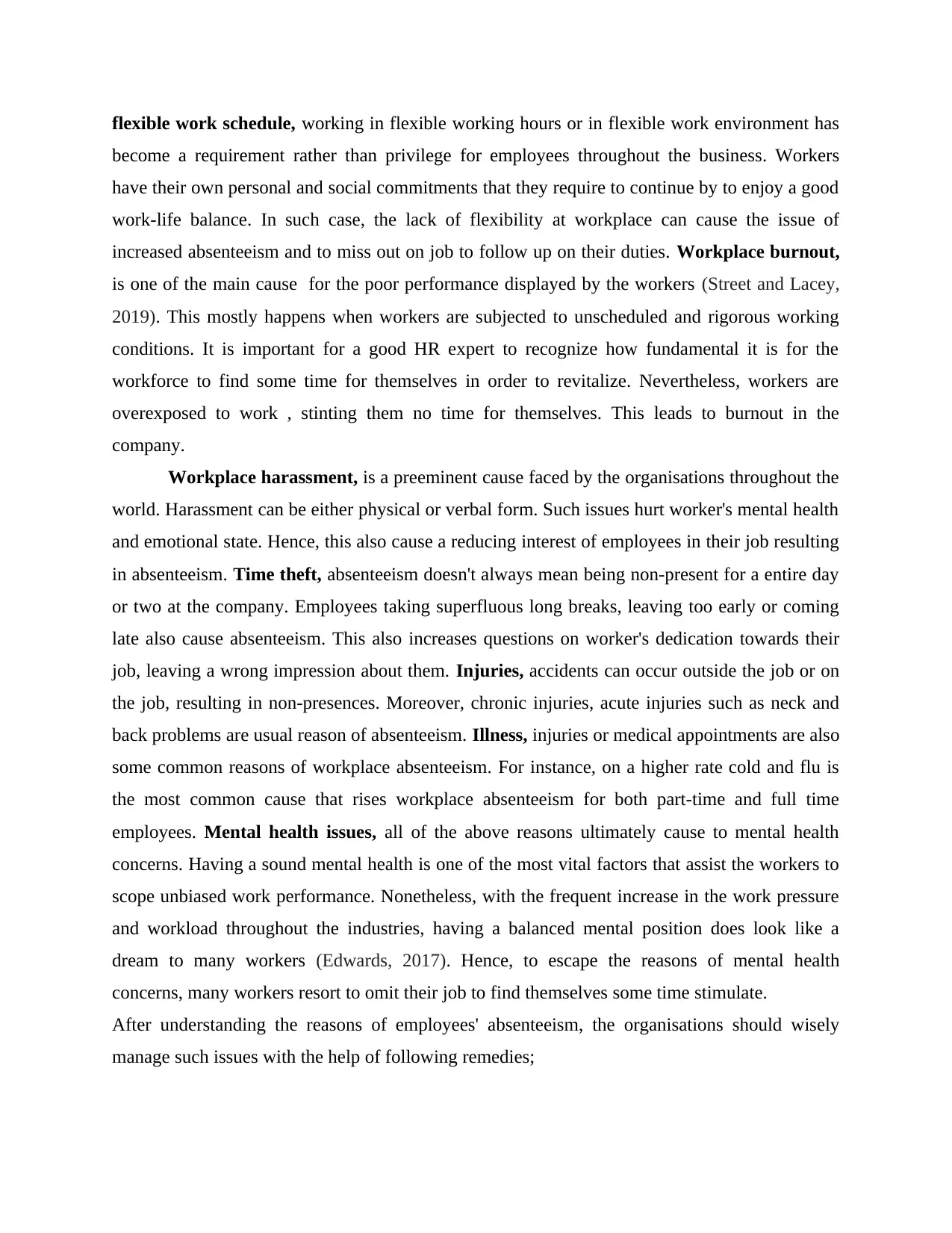
flexible work schedule, working in flexible working hours or in flexible work environment has
become a requirement rather than privilege for employees throughout the business. Workers
have their own personal and social commitments that they require to continue by to enjoy a good
work-life balance. In such case, the lack of flexibility at workplace can cause the issue of
increased absenteeism and to miss out on job to follow up on their duties. Workplace burnout,
is one of the main cause for the poor performance displayed by the workers (Street and Lacey,
2019). This mostly happens when workers are subjected to unscheduled and rigorous working
conditions. It is important for a good HR expert to recognize how fundamental it is for the
workforce to find some time for themselves in order to revitalize. Nevertheless, workers are
overexposed to work , stinting them no time for themselves. This leads to burnout in the
company.
Workplace harassment, is a preeminent cause faced by the organisations throughout the
world. Harassment can be either physical or verbal form. Such issues hurt worker's mental health
and emotional state. Hence, this also cause a reducing interest of employees in their job resulting
in absenteeism. Time theft, absenteeism doesn't always mean being non-present for a entire day
or two at the company. Employees taking superfluous long breaks, leaving too early or coming
late also cause absenteeism. This also increases questions on worker's dedication towards their
job, leaving a wrong impression about them. Injuries, accidents can occur outside the job or on
the job, resulting in non-presences. Moreover, chronic injuries, acute injuries such as neck and
back problems are usual reason of absenteeism. Illness, injuries or medical appointments are also
some common reasons of workplace absenteeism. For instance, on a higher rate cold and flu is
the most common cause that rises workplace absenteeism for both part-time and full time
employees. Mental health issues, all of the above reasons ultimately cause to mental health
concerns. Having a sound mental health is one of the most vital factors that assist the workers to
scope unbiased work performance. Nonetheless, with the frequent increase in the work pressure
and workload throughout the industries, having a balanced mental position does look like a
dream to many workers (Edwards, 2017). Hence, to escape the reasons of mental health
concerns, many workers resort to omit their job to find themselves some time stimulate.
After understanding the reasons of employees' absenteeism, the organisations should wisely
manage such issues with the help of following remedies;
become a requirement rather than privilege for employees throughout the business. Workers
have their own personal and social commitments that they require to continue by to enjoy a good
work-life balance. In such case, the lack of flexibility at workplace can cause the issue of
increased absenteeism and to miss out on job to follow up on their duties. Workplace burnout,
is one of the main cause for the poor performance displayed by the workers (Street and Lacey,
2019). This mostly happens when workers are subjected to unscheduled and rigorous working
conditions. It is important for a good HR expert to recognize how fundamental it is for the
workforce to find some time for themselves in order to revitalize. Nevertheless, workers are
overexposed to work , stinting them no time for themselves. This leads to burnout in the
company.
Workplace harassment, is a preeminent cause faced by the organisations throughout the
world. Harassment can be either physical or verbal form. Such issues hurt worker's mental health
and emotional state. Hence, this also cause a reducing interest of employees in their job resulting
in absenteeism. Time theft, absenteeism doesn't always mean being non-present for a entire day
or two at the company. Employees taking superfluous long breaks, leaving too early or coming
late also cause absenteeism. This also increases questions on worker's dedication towards their
job, leaving a wrong impression about them. Injuries, accidents can occur outside the job or on
the job, resulting in non-presences. Moreover, chronic injuries, acute injuries such as neck and
back problems are usual reason of absenteeism. Illness, injuries or medical appointments are also
some common reasons of workplace absenteeism. For instance, on a higher rate cold and flu is
the most common cause that rises workplace absenteeism for both part-time and full time
employees. Mental health issues, all of the above reasons ultimately cause to mental health
concerns. Having a sound mental health is one of the most vital factors that assist the workers to
scope unbiased work performance. Nonetheless, with the frequent increase in the work pressure
and workload throughout the industries, having a balanced mental position does look like a
dream to many workers (Edwards, 2017). Hence, to escape the reasons of mental health
concerns, many workers resort to omit their job to find themselves some time stimulate.
After understanding the reasons of employees' absenteeism, the organisations should wisely
manage such issues with the help of following remedies;
Paraphrase This Document
Need a fresh take? Get an instant paraphrase of this document with our AI Paraphraser
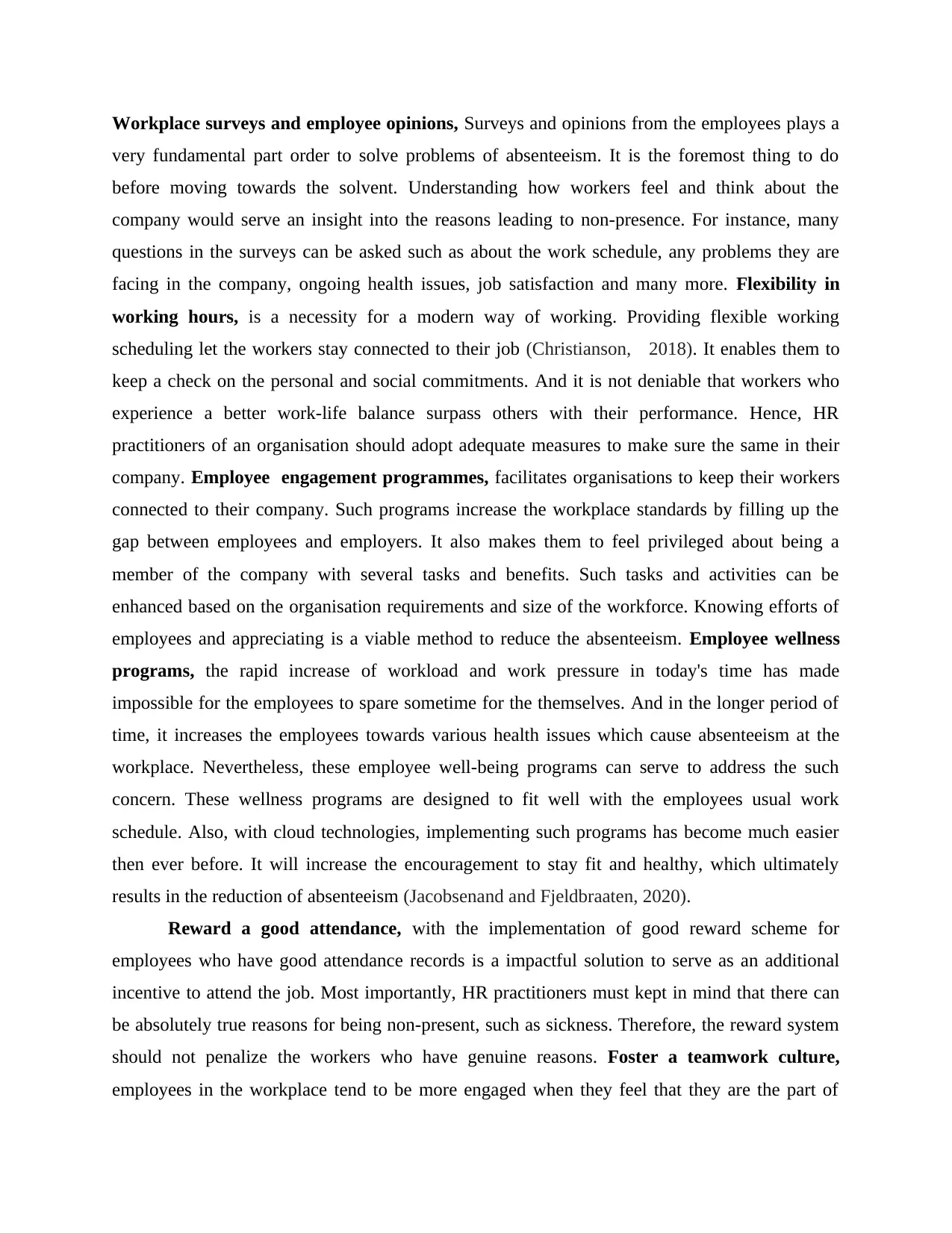
Workplace surveys and employee opinions, Surveys and opinions from the employees plays a
very fundamental part order to solve problems of absenteeism. It is the foremost thing to do
before moving towards the solvent. Understanding how workers feel and think about the
company would serve an insight into the reasons leading to non-presence. For instance, many
questions in the surveys can be asked such as about the work schedule, any problems they are
facing in the company, ongoing health issues, job satisfaction and many more. Flexibility in
working hours, is a necessity for a modern way of working. Providing flexible working
scheduling let the workers stay connected to their job (Christianson, 2018). It enables them to
keep a check on the personal and social commitments. And it is not deniable that workers who
experience a better work-life balance surpass others with their performance. Hence, HR
practitioners of an organisation should adopt adequate measures to make sure the same in their
company. Employee engagement programmes, facilitates organisations to keep their workers
connected to their company. Such programs increase the workplace standards by filling up the
gap between employees and employers. It also makes them to feel privileged about being a
member of the company with several tasks and benefits. Such tasks and activities can be
enhanced based on the organisation requirements and size of the workforce. Knowing efforts of
employees and appreciating is a viable method to reduce the absenteeism. Employee wellness
programs, the rapid increase of workload and work pressure in today's time has made
impossible for the employees to spare sometime for the themselves. And in the longer period of
time, it increases the employees towards various health issues which cause absenteeism at the
workplace. Nevertheless, these employee well-being programs can serve to address the such
concern. These wellness programs are designed to fit well with the employees usual work
schedule. Also, with cloud technologies, implementing such programs has become much easier
then ever before. It will increase the encouragement to stay fit and healthy, which ultimately
results in the reduction of absenteeism (Jacobsenand and Fjeldbraaten, 2020).
Reward a good attendance, with the implementation of good reward scheme for
employees who have good attendance records is a impactful solution to serve as an additional
incentive to attend the job. Most importantly, HR practitioners must kept in mind that there can
be absolutely true reasons for being non-present, such as sickness. Therefore, the reward system
should not penalize the workers who have genuine reasons. Foster a teamwork culture,
employees in the workplace tend to be more engaged when they feel that they are the part of
very fundamental part order to solve problems of absenteeism. It is the foremost thing to do
before moving towards the solvent. Understanding how workers feel and think about the
company would serve an insight into the reasons leading to non-presence. For instance, many
questions in the surveys can be asked such as about the work schedule, any problems they are
facing in the company, ongoing health issues, job satisfaction and many more. Flexibility in
working hours, is a necessity for a modern way of working. Providing flexible working
scheduling let the workers stay connected to their job (Christianson, 2018). It enables them to
keep a check on the personal and social commitments. And it is not deniable that workers who
experience a better work-life balance surpass others with their performance. Hence, HR
practitioners of an organisation should adopt adequate measures to make sure the same in their
company. Employee engagement programmes, facilitates organisations to keep their workers
connected to their company. Such programs increase the workplace standards by filling up the
gap between employees and employers. It also makes them to feel privileged about being a
member of the company with several tasks and benefits. Such tasks and activities can be
enhanced based on the organisation requirements and size of the workforce. Knowing efforts of
employees and appreciating is a viable method to reduce the absenteeism. Employee wellness
programs, the rapid increase of workload and work pressure in today's time has made
impossible for the employees to spare sometime for the themselves. And in the longer period of
time, it increases the employees towards various health issues which cause absenteeism at the
workplace. Nevertheless, these employee well-being programs can serve to address the such
concern. These wellness programs are designed to fit well with the employees usual work
schedule. Also, with cloud technologies, implementing such programs has become much easier
then ever before. It will increase the encouragement to stay fit and healthy, which ultimately
results in the reduction of absenteeism (Jacobsenand and Fjeldbraaten, 2020).
Reward a good attendance, with the implementation of good reward scheme for
employees who have good attendance records is a impactful solution to serve as an additional
incentive to attend the job. Most importantly, HR practitioners must kept in mind that there can
be absolutely true reasons for being non-present, such as sickness. Therefore, the reward system
should not penalize the workers who have genuine reasons. Foster a teamwork culture,
employees in the workplace tend to be more engaged when they feel that they are the part of
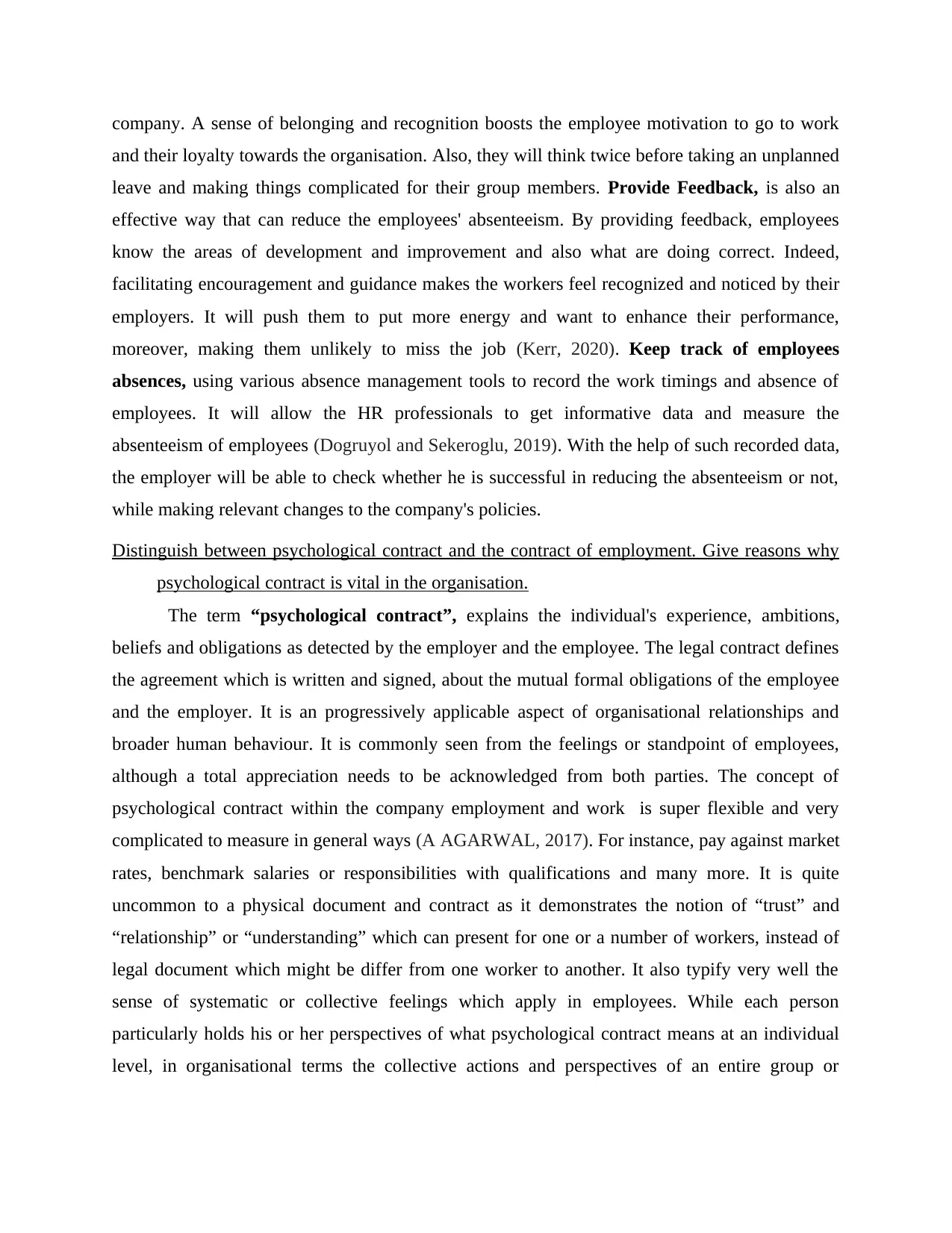
company. A sense of belonging and recognition boosts the employee motivation to go to work
and their loyalty towards the organisation. Also, they will think twice before taking an unplanned
leave and making things complicated for their group members. Provide Feedback, is also an
effective way that can reduce the employees' absenteeism. By providing feedback, employees
know the areas of development and improvement and also what are doing correct. Indeed,
facilitating encouragement and guidance makes the workers feel recognized and noticed by their
employers. It will push them to put more energy and want to enhance their performance,
moreover, making them unlikely to miss the job (Kerr, 2020). Keep track of employees
absences, using various absence management tools to record the work timings and absence of
employees. It will allow the HR professionals to get informative data and measure the
absenteeism of employees (Dogruyol and Sekeroglu, 2019). With the help of such recorded data,
the employer will be able to check whether he is successful in reducing the absenteeism or not,
while making relevant changes to the company's policies.
Distinguish between psychological contract and the contract of employment. Give reasons why
psychological contract is vital in the organisation.
The term “psychological contract”, explains the individual's experience, ambitions,
beliefs and obligations as detected by the employer and the employee. The legal contract defines
the agreement which is written and signed, about the mutual formal obligations of the employee
and the employer. It is an progressively applicable aspect of organisational relationships and
broader human behaviour. It is commonly seen from the feelings or standpoint of employees,
although a total appreciation needs to be acknowledged from both parties. The concept of
psychological contract within the company employment and work is super flexible and very
complicated to measure in general ways (A AGARWAL, 2017). For instance, pay against market
rates, benchmark salaries or responsibilities with qualifications and many more. It is quite
uncommon to a physical document and contract as it demonstrates the notion of “trust” and
“relationship” or “understanding” which can present for one or a number of workers, instead of
legal document which might be differ from one worker to another. It also typify very well the
sense of systematic or collective feelings which apply in employees. While each person
particularly holds his or her perspectives of what psychological contract means at an individual
level, in organisational terms the collective actions and perspectives of an entire group or
and their loyalty towards the organisation. Also, they will think twice before taking an unplanned
leave and making things complicated for their group members. Provide Feedback, is also an
effective way that can reduce the employees' absenteeism. By providing feedback, employees
know the areas of development and improvement and also what are doing correct. Indeed,
facilitating encouragement and guidance makes the workers feel recognized and noticed by their
employers. It will push them to put more energy and want to enhance their performance,
moreover, making them unlikely to miss the job (Kerr, 2020). Keep track of employees
absences, using various absence management tools to record the work timings and absence of
employees. It will allow the HR professionals to get informative data and measure the
absenteeism of employees (Dogruyol and Sekeroglu, 2019). With the help of such recorded data,
the employer will be able to check whether he is successful in reducing the absenteeism or not,
while making relevant changes to the company's policies.
Distinguish between psychological contract and the contract of employment. Give reasons why
psychological contract is vital in the organisation.
The term “psychological contract”, explains the individual's experience, ambitions,
beliefs and obligations as detected by the employer and the employee. The legal contract defines
the agreement which is written and signed, about the mutual formal obligations of the employee
and the employer. It is an progressively applicable aspect of organisational relationships and
broader human behaviour. It is commonly seen from the feelings or standpoint of employees,
although a total appreciation needs to be acknowledged from both parties. The concept of
psychological contract within the company employment and work is super flexible and very
complicated to measure in general ways (A AGARWAL, 2017). For instance, pay against market
rates, benchmark salaries or responsibilities with qualifications and many more. It is quite
uncommon to a physical document and contract as it demonstrates the notion of “trust” and
“relationship” or “understanding” which can present for one or a number of workers, instead of
legal document which might be differ from one worker to another. It also typify very well the
sense of systematic or collective feelings which apply in employees. While each person
particularly holds his or her perspectives of what psychological contract means at an individual
level, in organisational terms the collective actions and perspectives of an entire group or
⊘ This is a preview!⊘
Do you want full access?
Subscribe today to unlock all pages.

Trusted by 1+ million students worldwide
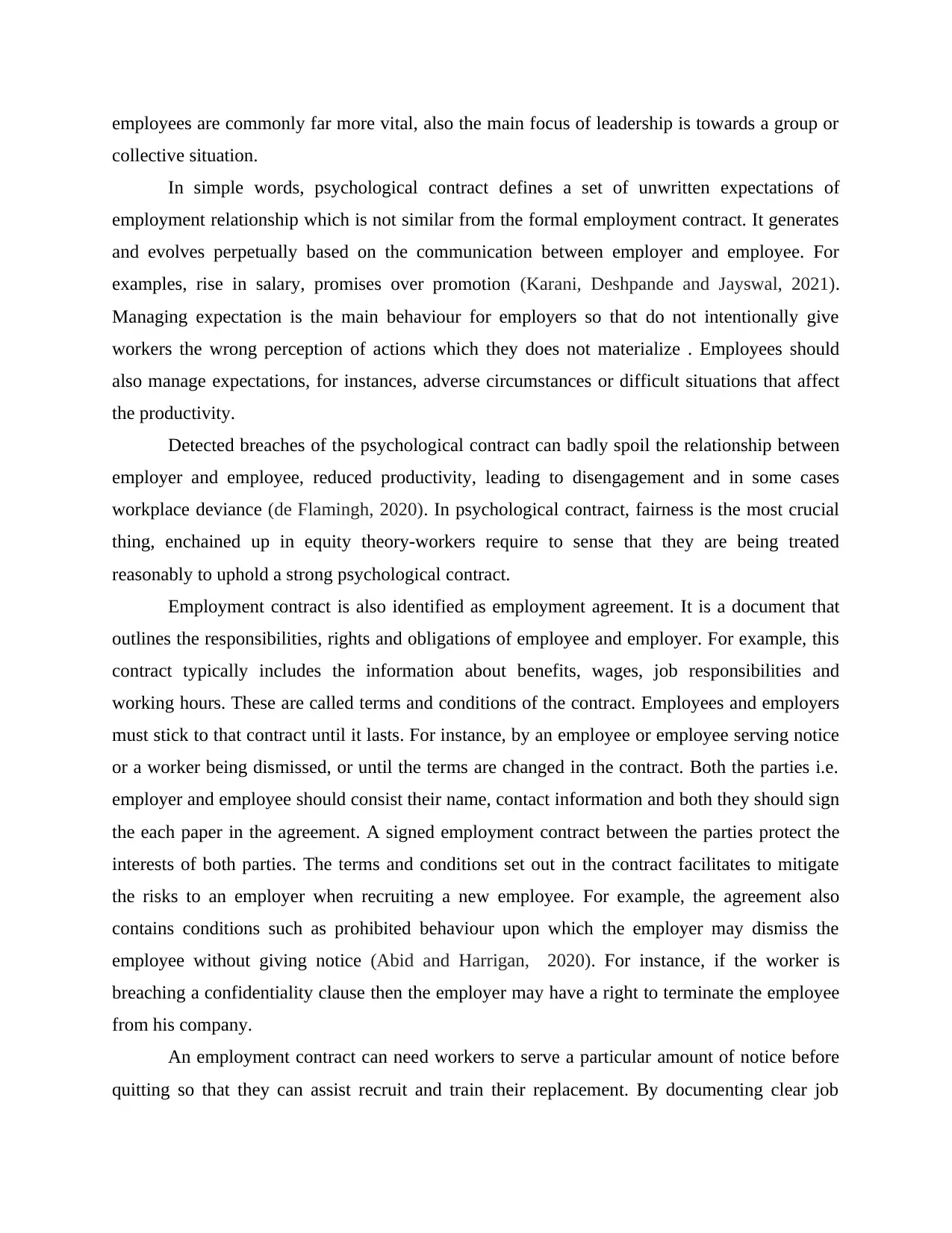
employees are commonly far more vital, also the main focus of leadership is towards a group or
collective situation.
In simple words, psychological contract defines a set of unwritten expectations of
employment relationship which is not similar from the formal employment contract. It generates
and evolves perpetually based on the communication between employer and employee. For
examples, rise in salary, promises over promotion (Karani, Deshpande and Jayswal, 2021).
Managing expectation is the main behaviour for employers so that do not intentionally give
workers the wrong perception of actions which they does not materialize . Employees should
also manage expectations, for instances, adverse circumstances or difficult situations that affect
the productivity.
Detected breaches of the psychological contract can badly spoil the relationship between
employer and employee, reduced productivity, leading to disengagement and in some cases
workplace deviance (de Flamingh, 2020). In psychological contract, fairness is the most crucial
thing, enchained up in equity theory-workers require to sense that they are being treated
reasonably to uphold a strong psychological contract.
Employment contract is also identified as employment agreement. It is a document that
outlines the responsibilities, rights and obligations of employee and employer. For example, this
contract typically includes the information about benefits, wages, job responsibilities and
working hours. These are called terms and conditions of the contract. Employees and employers
must stick to that contract until it lasts. For instance, by an employee or employee serving notice
or a worker being dismissed, or until the terms are changed in the contract. Both the parties i.e.
employer and employee should consist their name, contact information and both they should sign
the each paper in the agreement. A signed employment contract between the parties protect the
interests of both parties. The terms and conditions set out in the contract facilitates to mitigate
the risks to an employer when recruiting a new employee. For example, the agreement also
contains conditions such as prohibited behaviour upon which the employer may dismiss the
employee without giving notice (Abid and Harrigan, 2020). For instance, if the worker is
breaching a confidentiality clause then the employer may have a right to terminate the employee
from his company.
An employment contract can need workers to serve a particular amount of notice before
quitting so that they can assist recruit and train their replacement. By documenting clear job
collective situation.
In simple words, psychological contract defines a set of unwritten expectations of
employment relationship which is not similar from the formal employment contract. It generates
and evolves perpetually based on the communication between employer and employee. For
examples, rise in salary, promises over promotion (Karani, Deshpande and Jayswal, 2021).
Managing expectation is the main behaviour for employers so that do not intentionally give
workers the wrong perception of actions which they does not materialize . Employees should
also manage expectations, for instances, adverse circumstances or difficult situations that affect
the productivity.
Detected breaches of the psychological contract can badly spoil the relationship between
employer and employee, reduced productivity, leading to disengagement and in some cases
workplace deviance (de Flamingh, 2020). In psychological contract, fairness is the most crucial
thing, enchained up in equity theory-workers require to sense that they are being treated
reasonably to uphold a strong psychological contract.
Employment contract is also identified as employment agreement. It is a document that
outlines the responsibilities, rights and obligations of employee and employer. For example, this
contract typically includes the information about benefits, wages, job responsibilities and
working hours. These are called terms and conditions of the contract. Employees and employers
must stick to that contract until it lasts. For instance, by an employee or employee serving notice
or a worker being dismissed, or until the terms are changed in the contract. Both the parties i.e.
employer and employee should consist their name, contact information and both they should sign
the each paper in the agreement. A signed employment contract between the parties protect the
interests of both parties. The terms and conditions set out in the contract facilitates to mitigate
the risks to an employer when recruiting a new employee. For example, the agreement also
contains conditions such as prohibited behaviour upon which the employer may dismiss the
employee without giving notice (Abid and Harrigan, 2020). For instance, if the worker is
breaching a confidentiality clause then the employer may have a right to terminate the employee
from his company.
An employment contract can need workers to serve a particular amount of notice before
quitting so that they can assist recruit and train their replacement. By documenting clear job
Paraphrase This Document
Need a fresh take? Get an instant paraphrase of this document with our AI Paraphraser
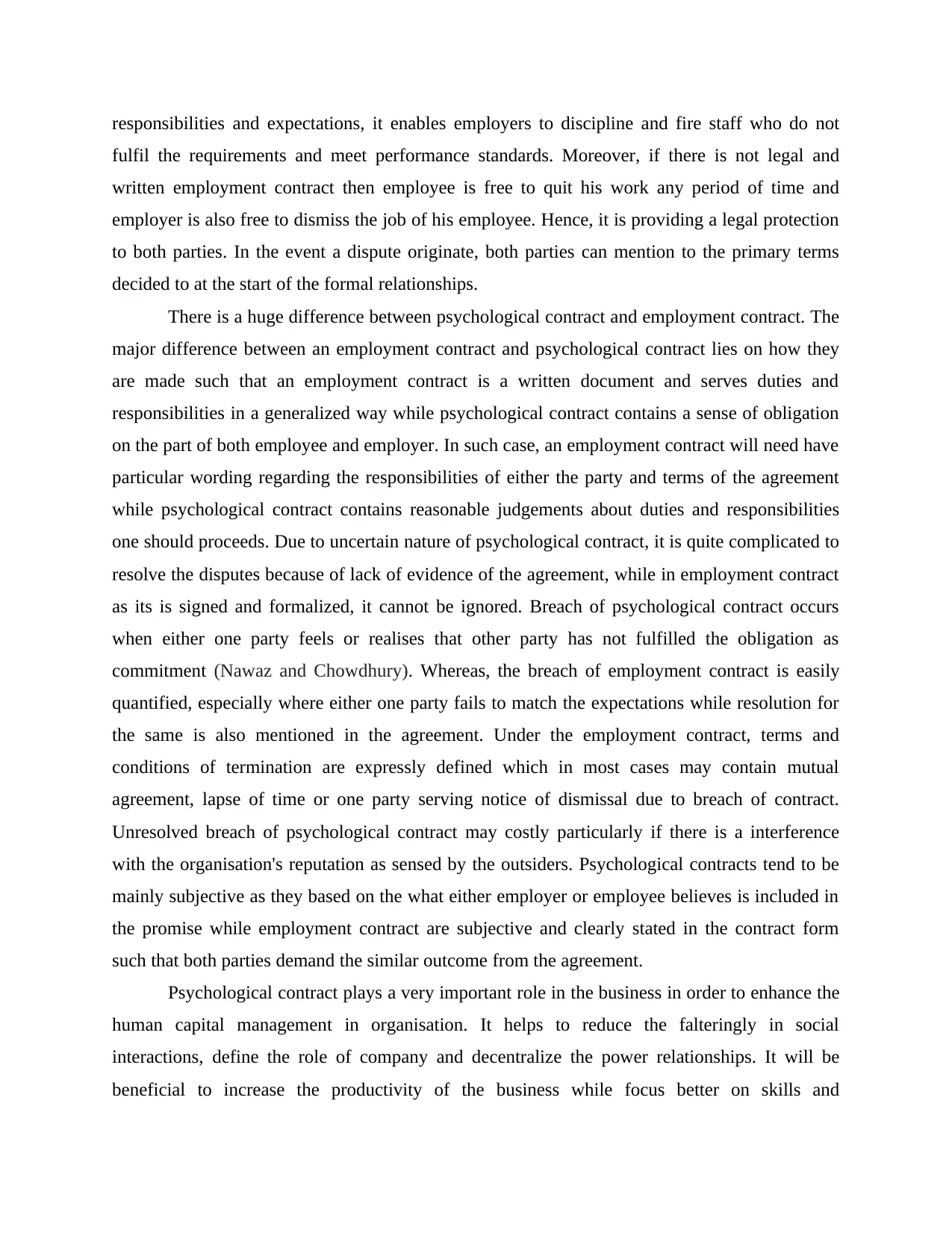
responsibilities and expectations, it enables employers to discipline and fire staff who do not
fulfil the requirements and meet performance standards. Moreover, if there is not legal and
written employment contract then employee is free to quit his work any period of time and
employer is also free to dismiss the job of his employee. Hence, it is providing a legal protection
to both parties. In the event a dispute originate, both parties can mention to the primary terms
decided to at the start of the formal relationships.
There is a huge difference between psychological contract and employment contract. The
major difference between an employment contract and psychological contract lies on how they
are made such that an employment contract is a written document and serves duties and
responsibilities in a generalized way while psychological contract contains a sense of obligation
on the part of both employee and employer. In such case, an employment contract will need have
particular wording regarding the responsibilities of either the party and terms of the agreement
while psychological contract contains reasonable judgements about duties and responsibilities
one should proceeds. Due to uncertain nature of psychological contract, it is quite complicated to
resolve the disputes because of lack of evidence of the agreement, while in employment contract
as its is signed and formalized, it cannot be ignored. Breach of psychological contract occurs
when either one party feels or realises that other party has not fulfilled the obligation as
commitment (Nawaz and Chowdhury). Whereas, the breach of employment contract is easily
quantified, especially where either one party fails to match the expectations while resolution for
the same is also mentioned in the agreement. Under the employment contract, terms and
conditions of termination are expressly defined which in most cases may contain mutual
agreement, lapse of time or one party serving notice of dismissal due to breach of contract.
Unresolved breach of psychological contract may costly particularly if there is a interference
with the organisation's reputation as sensed by the outsiders. Psychological contracts tend to be
mainly subjective as they based on the what either employer or employee believes is included in
the promise while employment contract are subjective and clearly stated in the contract form
such that both parties demand the similar outcome from the agreement.
Psychological contract plays a very important role in the business in order to enhance the
human capital management in organisation. It helps to reduce the falteringly in social
interactions, define the role of company and decentralize the power relationships. It will be
beneficial to increase the productivity of the business while focus better on skills and
fulfil the requirements and meet performance standards. Moreover, if there is not legal and
written employment contract then employee is free to quit his work any period of time and
employer is also free to dismiss the job of his employee. Hence, it is providing a legal protection
to both parties. In the event a dispute originate, both parties can mention to the primary terms
decided to at the start of the formal relationships.
There is a huge difference between psychological contract and employment contract. The
major difference between an employment contract and psychological contract lies on how they
are made such that an employment contract is a written document and serves duties and
responsibilities in a generalized way while psychological contract contains a sense of obligation
on the part of both employee and employer. In such case, an employment contract will need have
particular wording regarding the responsibilities of either the party and terms of the agreement
while psychological contract contains reasonable judgements about duties and responsibilities
one should proceeds. Due to uncertain nature of psychological contract, it is quite complicated to
resolve the disputes because of lack of evidence of the agreement, while in employment contract
as its is signed and formalized, it cannot be ignored. Breach of psychological contract occurs
when either one party feels or realises that other party has not fulfilled the obligation as
commitment (Nawaz and Chowdhury). Whereas, the breach of employment contract is easily
quantified, especially where either one party fails to match the expectations while resolution for
the same is also mentioned in the agreement. Under the employment contract, terms and
conditions of termination are expressly defined which in most cases may contain mutual
agreement, lapse of time or one party serving notice of dismissal due to breach of contract.
Unresolved breach of psychological contract may costly particularly if there is a interference
with the organisation's reputation as sensed by the outsiders. Psychological contracts tend to be
mainly subjective as they based on the what either employer or employee believes is included in
the promise while employment contract are subjective and clearly stated in the contract form
such that both parties demand the similar outcome from the agreement.
Psychological contract plays a very important role in the business in order to enhance the
human capital management in organisation. It helps to reduce the falteringly in social
interactions, define the role of company and decentralize the power relationships. It will be
beneficial to increase the productivity of the business while focus better on skills and
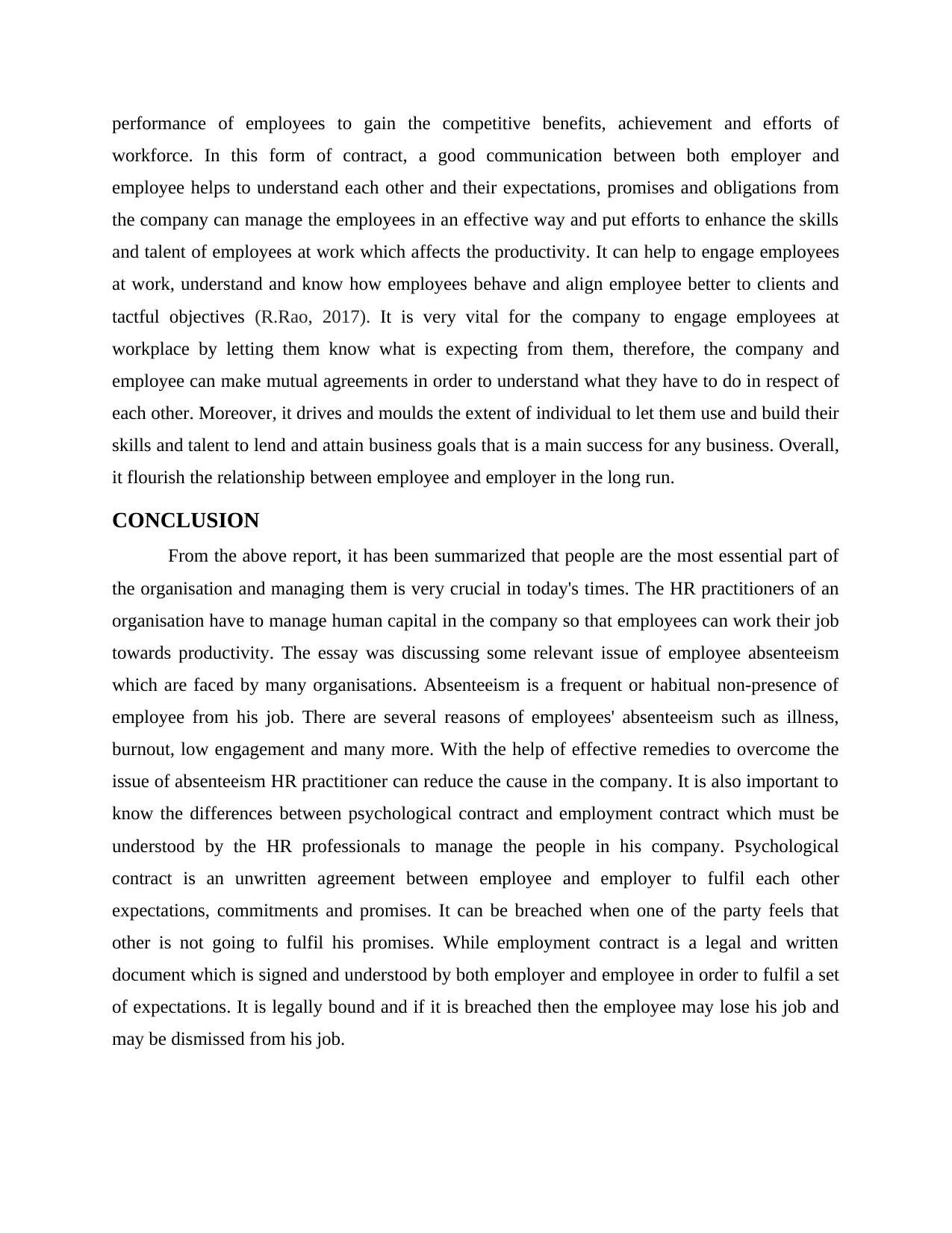
performance of employees to gain the competitive benefits, achievement and efforts of
workforce. In this form of contract, a good communication between both employer and
employee helps to understand each other and their expectations, promises and obligations from
the company can manage the employees in an effective way and put efforts to enhance the skills
and talent of employees at work which affects the productivity. It can help to engage employees
at work, understand and know how employees behave and align employee better to clients and
tactful objectives (R.Rao, 2017). It is very vital for the company to engage employees at
workplace by letting them know what is expecting from them, therefore, the company and
employee can make mutual agreements in order to understand what they have to do in respect of
each other. Moreover, it drives and moulds the extent of individual to let them use and build their
skills and talent to lend and attain business goals that is a main success for any business. Overall,
it flourish the relationship between employee and employer in the long run.
CONCLUSION
From the above report, it has been summarized that people are the most essential part of
the organisation and managing them is very crucial in today's times. The HR practitioners of an
organisation have to manage human capital in the company so that employees can work their job
towards productivity. The essay was discussing some relevant issue of employee absenteeism
which are faced by many organisations. Absenteeism is a frequent or habitual non-presence of
employee from his job. There are several reasons of employees' absenteeism such as illness,
burnout, low engagement and many more. With the help of effective remedies to overcome the
issue of absenteeism HR practitioner can reduce the cause in the company. It is also important to
know the differences between psychological contract and employment contract which must be
understood by the HR professionals to manage the people in his company. Psychological
contract is an unwritten agreement between employee and employer to fulfil each other
expectations, commitments and promises. It can be breached when one of the party feels that
other is not going to fulfil his promises. While employment contract is a legal and written
document which is signed and understood by both employer and employee in order to fulfil a set
of expectations. It is legally bound and if it is breached then the employee may lose his job and
may be dismissed from his job.
workforce. In this form of contract, a good communication between both employer and
employee helps to understand each other and their expectations, promises and obligations from
the company can manage the employees in an effective way and put efforts to enhance the skills
and talent of employees at work which affects the productivity. It can help to engage employees
at work, understand and know how employees behave and align employee better to clients and
tactful objectives (R.Rao, 2017). It is very vital for the company to engage employees at
workplace by letting them know what is expecting from them, therefore, the company and
employee can make mutual agreements in order to understand what they have to do in respect of
each other. Moreover, it drives and moulds the extent of individual to let them use and build their
skills and talent to lend and attain business goals that is a main success for any business. Overall,
it flourish the relationship between employee and employer in the long run.
CONCLUSION
From the above report, it has been summarized that people are the most essential part of
the organisation and managing them is very crucial in today's times. The HR practitioners of an
organisation have to manage human capital in the company so that employees can work their job
towards productivity. The essay was discussing some relevant issue of employee absenteeism
which are faced by many organisations. Absenteeism is a frequent or habitual non-presence of
employee from his job. There are several reasons of employees' absenteeism such as illness,
burnout, low engagement and many more. With the help of effective remedies to overcome the
issue of absenteeism HR practitioner can reduce the cause in the company. It is also important to
know the differences between psychological contract and employment contract which must be
understood by the HR professionals to manage the people in his company. Psychological
contract is an unwritten agreement between employee and employer to fulfil each other
expectations, commitments and promises. It can be breached when one of the party feels that
other is not going to fulfil his promises. While employment contract is a legal and written
document which is signed and understood by both employer and employee in order to fulfil a set
of expectations. It is legally bound and if it is breached then the employee may lose his job and
may be dismissed from his job.
⊘ This is a preview!⊘
Do you want full access?
Subscribe today to unlock all pages.

Trusted by 1+ million students worldwide

Paraphrase This Document
Need a fresh take? Get an instant paraphrase of this document with our AI Paraphraser
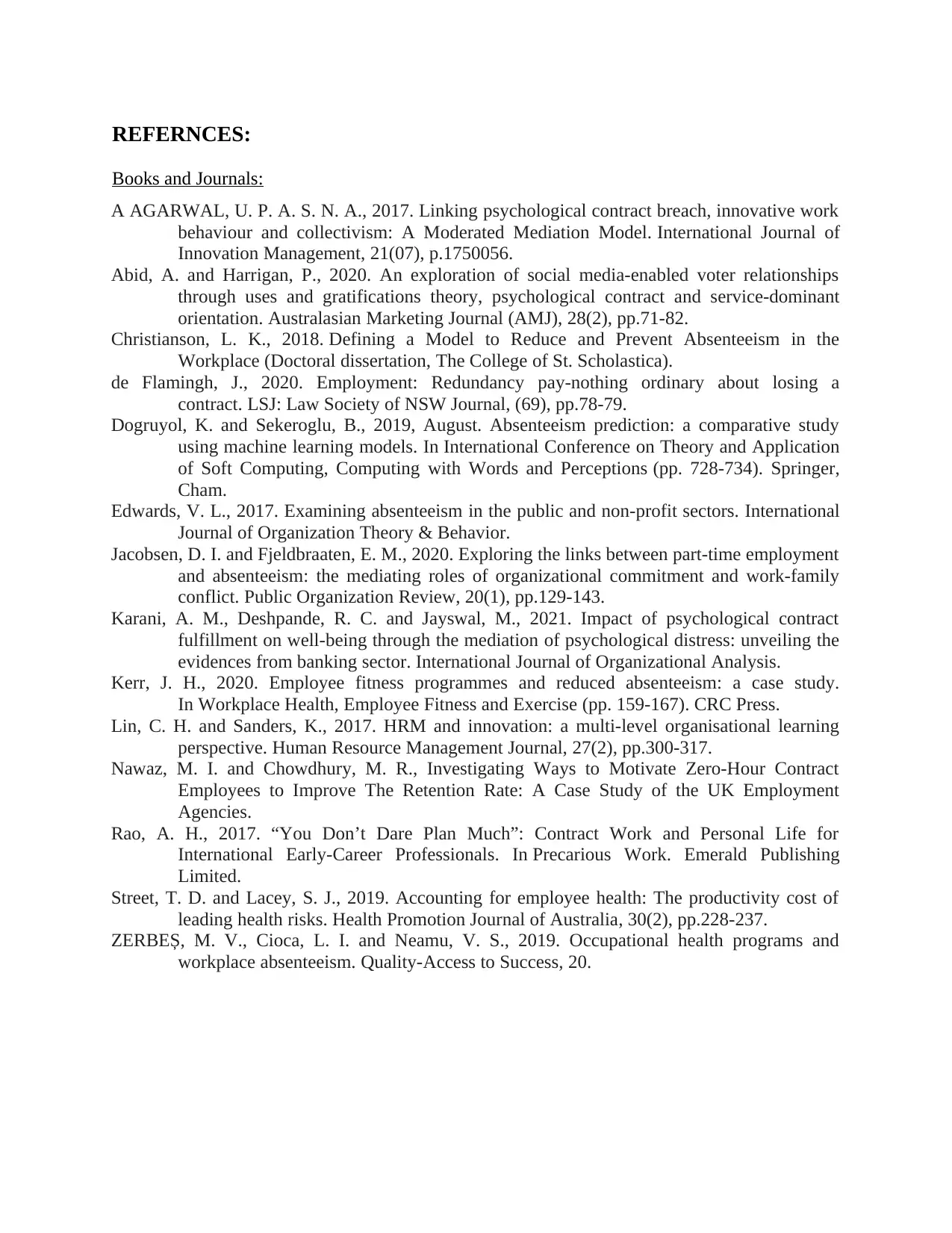
REFERNCES:
Books and Journals:
A AGARWAL, U. P. A. S. N. A., 2017. Linking psychological contract breach, innovative work
behaviour and collectivism: A Moderated Mediation Model. International Journal of
Innovation Management, 21(07), p.1750056.
Abid, A. and Harrigan, P., 2020. An exploration of social media-enabled voter relationships
through uses and gratifications theory, psychological contract and service-dominant
orientation. Australasian Marketing Journal (AMJ), 28(2), pp.71-82.
Christianson, L. K., 2018. Defining a Model to Reduce and Prevent Absenteeism in the
Workplace (Doctoral dissertation, The College of St. Scholastica).
de Flamingh, J., 2020. Employment: Redundancy pay-nothing ordinary about losing a
contract. LSJ: Law Society of NSW Journal, (69), pp.78-79.
Dogruyol, K. and Sekeroglu, B., 2019, August. Absenteeism prediction: a comparative study
using machine learning models. In International Conference on Theory and Application
of Soft Computing, Computing with Words and Perceptions (pp. 728-734). Springer,
Cham.
Edwards, V. L., 2017. Examining absenteeism in the public and non-profit sectors. International
Journal of Organization Theory & Behavior.
Jacobsen, D. I. and Fjeldbraaten, E. M., 2020. Exploring the links between part-time employment
and absenteeism: the mediating roles of organizational commitment and work-family
conflict. Public Organization Review, 20(1), pp.129-143.
Karani, A. M., Deshpande, R. C. and Jayswal, M., 2021. Impact of psychological contract
fulfillment on well-being through the mediation of psychological distress: unveiling the
evidences from banking sector. International Journal of Organizational Analysis.
Kerr, J. H., 2020. Employee fitness programmes and reduced absenteeism: a case study.
In Workplace Health, Employee Fitness and Exercise (pp. 159-167). CRC Press.
Lin, C. H. and Sanders, K., 2017. HRM and innovation: a multi‐level organisational learning
perspective. Human Resource Management Journal, 27(2), pp.300-317.
Nawaz, M. I. and Chowdhury, M. R., Investigating Ways to Motivate Zero-Hour Contract
Employees to Improve The Retention Rate: A Case Study of the UK Employment
Agencies.
Rao, A. H., 2017. “You Don’t Dare Plan Much”: Contract Work and Personal Life for
International Early-Career Professionals. In Precarious Work. Emerald Publishing
Limited.
Street, T. D. and Lacey, S. J., 2019. Accounting for employee health: The productivity cost of
leading health risks. Health Promotion Journal of Australia, 30(2), pp.228-237.
ZERBEȘ, M. V., Cioca, L. I. and Neamu, V. S., 2019. Occupational health programs and
workplace absenteeism. Quality-Access to Success, 20.
Books and Journals:
A AGARWAL, U. P. A. S. N. A., 2017. Linking psychological contract breach, innovative work
behaviour and collectivism: A Moderated Mediation Model. International Journal of
Innovation Management, 21(07), p.1750056.
Abid, A. and Harrigan, P., 2020. An exploration of social media-enabled voter relationships
through uses and gratifications theory, psychological contract and service-dominant
orientation. Australasian Marketing Journal (AMJ), 28(2), pp.71-82.
Christianson, L. K., 2018. Defining a Model to Reduce and Prevent Absenteeism in the
Workplace (Doctoral dissertation, The College of St. Scholastica).
de Flamingh, J., 2020. Employment: Redundancy pay-nothing ordinary about losing a
contract. LSJ: Law Society of NSW Journal, (69), pp.78-79.
Dogruyol, K. and Sekeroglu, B., 2019, August. Absenteeism prediction: a comparative study
using machine learning models. In International Conference on Theory and Application
of Soft Computing, Computing with Words and Perceptions (pp. 728-734). Springer,
Cham.
Edwards, V. L., 2017. Examining absenteeism in the public and non-profit sectors. International
Journal of Organization Theory & Behavior.
Jacobsen, D. I. and Fjeldbraaten, E. M., 2020. Exploring the links between part-time employment
and absenteeism: the mediating roles of organizational commitment and work-family
conflict. Public Organization Review, 20(1), pp.129-143.
Karani, A. M., Deshpande, R. C. and Jayswal, M., 2021. Impact of psychological contract
fulfillment on well-being through the mediation of psychological distress: unveiling the
evidences from banking sector. International Journal of Organizational Analysis.
Kerr, J. H., 2020. Employee fitness programmes and reduced absenteeism: a case study.
In Workplace Health, Employee Fitness and Exercise (pp. 159-167). CRC Press.
Lin, C. H. and Sanders, K., 2017. HRM and innovation: a multi‐level organisational learning
perspective. Human Resource Management Journal, 27(2), pp.300-317.
Nawaz, M. I. and Chowdhury, M. R., Investigating Ways to Motivate Zero-Hour Contract
Employees to Improve The Retention Rate: A Case Study of the UK Employment
Agencies.
Rao, A. H., 2017. “You Don’t Dare Plan Much”: Contract Work and Personal Life for
International Early-Career Professionals. In Precarious Work. Emerald Publishing
Limited.
Street, T. D. and Lacey, S. J., 2019. Accounting for employee health: The productivity cost of
leading health risks. Health Promotion Journal of Australia, 30(2), pp.228-237.
ZERBEȘ, M. V., Cioca, L. I. and Neamu, V. S., 2019. Occupational health programs and
workplace absenteeism. Quality-Access to Success, 20.
1 out of 11
Related Documents
Your All-in-One AI-Powered Toolkit for Academic Success.
+13062052269
info@desklib.com
Available 24*7 on WhatsApp / Email
![[object Object]](/_next/static/media/star-bottom.7253800d.svg)
Unlock your academic potential
Copyright © 2020–2026 A2Z Services. All Rights Reserved. Developed and managed by ZUCOL.




